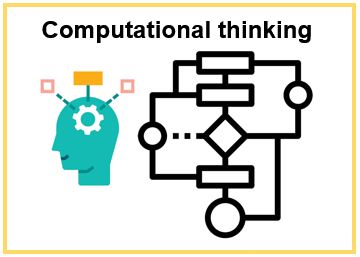Overview
Computational Thinking refers to the ability to think logically, break down complex problems into smaller parts, and design solutions using computational concepts and techniques. It involves a set of problem-solving skills that can be applied in various fields and situations, not just limited to computer science.
The recognition of Computational Thinking as a crucial skill in the compulsory curriculum for Math lessons in Singapore highlights its growing importance in today's digital age. It equips students with the ability to analyze problems, think critically, and develop systematic approaches to problem-solving. By incorporating Computational Thinking into the curriculum, students are exposed to computational concepts and techniques from an early age, preparing them for the increasingly technology-driven world.
计算思维Computational Thinking是指以逻辑思维、将复杂问题分解为较小部分,并使用计算概念和技术设计解决方案的能力。它涉及一组解决问题的技能,不仅局限于计算机科学,可应用于各个领域和情境。
新加坡将计算思维Computational Thinking纳入数学课程的强制性课程中,突显了它在当今数字时代的重要性。这让学生具备了分析问题、批判性思考和系统性解决问题的能力。通过将计算思维纳入课程中,学生从小就接触到计算概念和技术,为他们适应日益依赖技术的世界做好准备。
Course Content
Minimum Participants: Minimum of 15 learners is required to start.
Registration Fee: $80 per participant (venue and refreshments not included).
Registration Process: Complete the full detail
Payment Details: Upon receipt of your registration details, an invoice will be sent with payment instructions.
Confirmation and Details: Once payment is received, a confirmation email with program details will be sent.
Learning Outcome
Throughout the workshop, we will delve into various tools and techniques that are integral to Computational thinking. We will explore:
1. Break down complex problems into smaller, manageable steps. For example, when planning a trip, you can use Computational Thinking to identify the sequence of actions required, such as booking tickets, finding accommodation, and planning activities.
2. Analysis of large datasets to extract meaningful insights. For instance, in healthcare, doctors can use Computational Thinking to analyse patient data and identify patterns to make informed diagnoses and treatment decisions.
3. Automate repetitive tasks and improve efficiency. For instance, in business, you can apply Computational Thinking to develop algorithms that automate inventory management or streamline customer support processes.
4. Create simulations and models to understand real-world phenomena. For example, in engineering, Computational Thinking can be used to simulate the behavior of structures under different conditions to optimize designs and ensure safety.
5. Apply creative expression in creative domains, such as art and music. Artists and musicians can use Computational Thinking to generate visual or auditory patterns, create interactive installations, or compose music using algorithms.
By the end of this workshop, participants will have a solid foundation in Computational thinking and be able to apply these tools and techniques to Algorithmic Problem Solving, Data Analysis, Automation and Efficiency’ Simulation and Modeling, Creative Expression.
The workshop will be interactive, combining facilitated discussions, gamification activities, and experiential and reflective learning based on the Kolb learning cycle.
These learning objectives aim to equip participants with a solid understanding of Computational Thinking and its practical application in various contexts. By the end of the course, participants will be able to effectively apply Computational Thinking principles to break down problems, analyse data, automate tasks, simulate phenomena, and foster creative expression.
在本次工作坊中,我们将深入探讨与计算思维密不可分的各种工具和技术。我们将探索以下内容:
将复杂问题分解为较小、可管理的步骤。例如,在规划旅行时,您可以运用计算思维来确定所需的行动顺序,如预订机票、寻找住宿和规划活动。
-分析大型数据集以提取有意义的见解。例如,在医疗领域中,医生可以使用计算思维来分析患者数据,识别模式以做出明智的诊断和治疗决策。
-自动化重复任务以提高效率。例如,在商业领域中,您可以应用计算思维来开发算法,实现库存管理的自动化或简化客户支持流程。
-创建模拟和模型以理解现实世界的现象。例如,在工程领域中,计算思维可以用于模拟不同条件下结构的行为,优化设计并确保安全性。
-在艺术和音乐等创意领域中应用创造性表达。艺术家和音乐家可以使用计算思维生成视觉或听觉模式,创建互动装置,或利用算法创作音乐。
通过本次工作坊会,参与者将建立坚实的计算思维基础,并能够将这些工具和技术应用于算法问题解决、数据分析、自动化与效率、模拟与建模、以及创意表达。研讨会将以互动方式进行,结合引导式讨论、游戏化活动以及基于科尔布学习循环的经验性和反思性学习。
这些学习目标旨在使参与者具备对计算思维的深入理解,并能够在各种情境下有效应用计算思维原理,分解问题、分析数据、自动化任务、模拟现象,并促进创造性表达。

